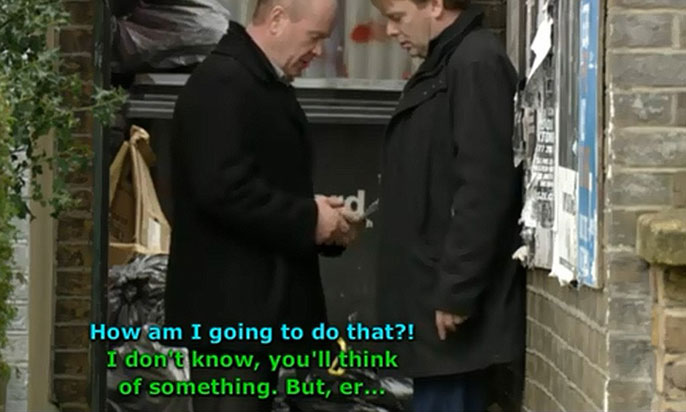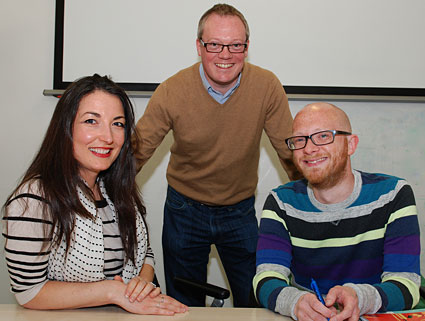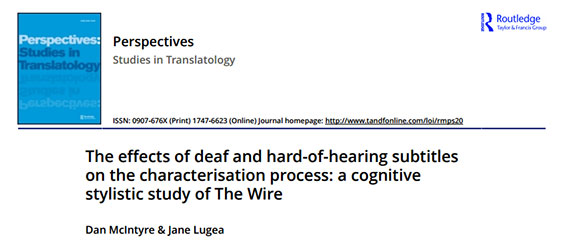Research shows TV programme subtitles only offer half the story

Wed, 04 May 2016 14:26:00 BST
Nuances of the characters and their relationships are often passed over and simplified in the subtitles
 ► Huddersfield lecturers Dr Jane Lugea and Professor Dan McIntyre are pictured with Ericsson's Subtitling Team Leader Dan Cooper-Gavin
► Huddersfield lecturers Dr Jane Lugea and Professor Dan McIntyre are pictured with Ericsson's Subtitling Team Leader Dan Cooper-Gavin
MILLIONS rely on subtitles when watching film and TV. It could be because they are hard of hearing, they are fans of foreign language drama or they need extra help when actors seem to be mumbling their lines. But are these viewers missing out on vital nuances in the dialogue? This is a burgeoning area for research and teaching at the University of Huddersfield, which has launched a course that trains a new cohort of subtle subtitlers.
For the University’s Dan McIntyre, who is Professor of English Language and Linguistics, and his colleague Dr Jane Lugea, subtitling has been a key area of investigation over the past four years. They have already completed a British Academy-funded project, analysing discrepancies between audio dialogue and the content of subtitles. They used an episode of U.S. TV drama The Wire as a case study and their findings have appeared in a journal article.
Professor McIntyre has also given a recent lecture on the subject, speaking to an audience at University College London. This led to contact with a leading industry figure who has now accepted an invitation to speak to University of Huddersfield students.
“In our research we found that an awful lot of information was being deleted from the dialogue. It is primarily what we call interpersonal information – not necessarily about content but information that you use to form relationships with people,” said Professor McIntyre.
The omissions include words and sounds described as backchanneling, including interjections such as “y’know” and “really?”.
“This doesn’t have a big impact on the actual propositional content – what the characters are saying – but when they are left out it means that if you are relying on subtitles it is really hard to get an idea of how those characters relate to each other, and quite often in drama it is the relations between characters that are as important as what they are saying,” explained Professor McIntyre.
 The limited word counts and space available to subtitlers mean that the issue cannot be solved completely, he admitted, but it is possible to find ways of reducing the problem. One is a new technique, for which special software is available, known as “creative subtitling”.
The limited word counts and space available to subtitlers mean that the issue cannot be solved completely, he admitted, but it is possible to find ways of reducing the problem. One is a new technique, for which special software is available, known as “creative subtitling”.
“You don’t simply leave the text at the bottom of the screen, but you might move it around the screen. You might have bigger fonts and use different colours or opaque text or you might angle the subtitle so that it is disappearing into the distance,” said Professor McIntyre. Such effects can help create a richer understanding of stories and characterisation.
University of Huddersfield students are now beginning to explore the potential of creative subtitling, as part of a new third-year module in the English Language and Linguistics degree course. They are required to select a film scene and add subtitles, using creative techniques to reflect nuances in the dialogue and characterisation. Then they write an essay explaining their decisions and how they have dealt with the inevitable restrictions placed on subtitles.
The new module has proved popular and has already attracted increased numbers for the next academic year. Although other universities offer courses in subtitling, they are mostly linked to language translation. The University of Huddersfield’s module is innovative because it is based on stylistics, said Professor McIntyre.
He and Dr Lugea will continue their work on subtitling, and languages lecturer Dr Sara Ramos Pinto, an experienced subtitler, has been appointed a visiting research fellow. On 26 April, Dan Cooper-Gavin, of communications and media giant Ericsson – who made contact with Professor McIntyre after his recent lecture at University College London – will come to the University of Huddersfield to speak about his company’s subtitling policies.
- The article, The effects of deaf and hard-of-hearing subtitles on the characterisation process: a cognitive stylistic study of The Wire, by Dan McIntyre and Jane Lugea,appears in Perspectives: Studies in Translatology, 2015 Vol.23, No. 1.







